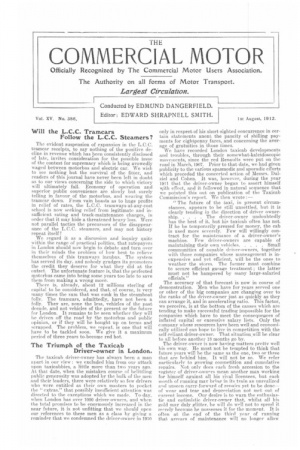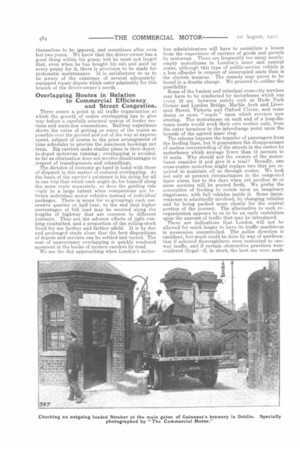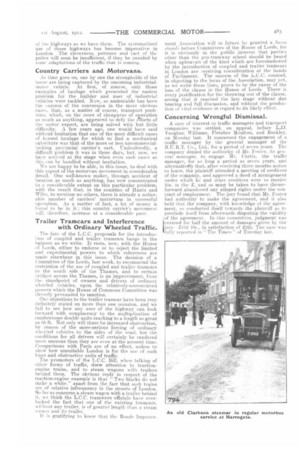Will the L.C.C. Tramcars
Page 1

Page 2

Page 3

If you've noticed an error in this article please click here to report it so we can fix it.
Follow the L.C.C. Steamers ?
The evident suspension of expansion in the L.C.C. tramcar receipts, to say nothing of the positive decline in revenue which has been consistently disclosed of late, invites consideration for the possible issue of the, contest for supremacy which is being avowedly waged between motorbus and electric car. We wish to see nothing but the survival of. the fitter, and readers of this journal have never been left in doubt as to our views concerning the side to which victory will ultimately fall. Economy of operation and superior public convenience are slowly but surely telling in favour of the motorbus, and wearing the tramcar down. From vain boasts as to huge profits in relief of rates, the L.C.C. tramways-at-any-cost school is now seeking relief from legitimate and insufficient rating and track-maintenance charges, in order that it may hide a threatened heavy loss. Were not parallel tactics the precursors of the disappearance of the L.C.C. steamers, and may not history repeat itself ?
We regard it as a discussion and inquiry quite within the range of practical politics, that ratepayers in London should now begin to debate and turn over in their minds the problem of how best to relieve themselves of this tramways incubus. The system has served its day, and nobody grudges its promoters the credit they deserve for what, they did at the outset. The unfortunate feature is, that the perfected motorbus came into being some years too late to save them from making a wrong move. There is, already, about 12 millions sterling of capital to be considered, and that, of course, is very many times the sum that was sunk in the steamboat folly. The tramcars, admittedly, have not been a folly. They are, none the less, vehicles of the past decade, and not vehicles of the present or the future for London. It remains to be seen whether they will be driven off the road by the motorbus and 'nubile opinion, or if they will be bought up on terms and scrapped. The problem, we repeat, is one that will have to be tackled soon. We give it a maximum period of three years to-become red hot.
The Triumph of the Taxicab
Driver.-owner in London.
The taxicab driver-owner has always been a man apart in our view : we excluded him from our attack upon taxieabbies, a little more than two years ago. At that date, when the mistaken course of belittling publin generosity was adopted by the hulk of the men and their leaders, there were relatively so few drivers who were entitled as their own masters to pocket i he " extras," that possibly insufficient attention was directed to the exceptions which we made. To-day, when London has over 1000 driver-owners, and when the total promises to be enormously increased in the near future, it is not unfitting that we should open our references to these men as a class by giving a reminder that we condemned the driver-owner in 1910 only in respect of his short-sighted concurrence in certain statements anent the paucity of shilling payments for eightpenny fares, and concerning the average of gratuities in those times. We have recorded London taxicab developments and troubles, through their somewhat-kaleidoscopic movements, since the red Renaults were put on the road in March, 1907. Prior to that date, we had given publicity to the various spasmodic and sporadic ciforts which preceded the concerted action of Messrs. DalzieI and Cohen. It was, however, during the year 1911 that the driver-owner began to assert himself with effect, and it followed in natural sequence that we pointed this out on publication of the Taxicab Commission's report. We then wrote :— "The future of the taxi, in present circum stances, appears to be still unsettled, hut it is clearly tending in the direction of driver owner ship. . . . The driver-owner undoubtedly has the best of it, but his taxicab often has not. If lie be temporarily pressed for money, the cab is used more severely. Few will willingly contract for the maintenance of a driver-owner's machine. Few driver-owners are capable of maintaining their own vehicles Small communities of cAnable driver-owners, together with those companies whose maneagement is inexpensive and yet efficient, will be the ones to weather the storm. The former must combine to secure efficient garage treatment ; the latter must not be hampered by many large-salaried officials."
The accuracy of that forecast is now in course of demonstration. Men who have for years served one or other of the big companies are changing over to the ranks of the driver-owner just as quickly as they can arrange it, and in accelerating ratio. This factor, we perceive, is at the bottom of the causes whieh are tending to make successful trading impossible for the companies which have to meet the consequences of inflated capital or excessive salary lists. Only the company whose resources have been well and economically utilized can hope to live in competition with the self-reliant driver-owner. That situation will be clear to all before another 18 months go by.
The driver-owner is now having matters pretty well his own way_ He must not be tempted to think that future years will be the same as the one, two or three that are behind him. It will not be so. We refer Particularly to growing competition and cumulative repairs. Not only does each fresh accession to the register of driver-owners mean another man working for himself against all his rival licensees, hut each month of running may bring in its train an unrealized ad unseen carry-forward of renairs yet. to be done— of wear and tear and depreciation not met. out of current income. Our desire is to warn the enthusiastic and optimistic driver-owner that., whilst all his gold may duly glitter, he will do well not to spend it merely because he possesses it for the moment. It is often at the, end of the third year of running that arrears of maintenance will no longer allow themselves to be ignored, and sometimes after even but two years. We know that the driver-owner has a good thing within his grasp, but he must not forget that, even when he has bought his cab and paid up every penny for it, there is provision to be made for systematic maintenance. It is satisfactory to us to be aware of the existence of several adequatelyequipped repair depots which cater admirably for this branch of the driver-owner's needs.
Overlapping Routes in Relation to Commercial Efficiency and Street Congestion.
There comes a point in all traffic organization at which the growth of undue overlapping has to give way before a carefully-schemed system of feeder sections and main-line connections. Railway experience shows the value of getting as ninny of the trains as possible over the ground and out of the way at express speed, subject of course to the prior arrangement of time schedules to provide the maximum bookings per train. Big carriers make similar plans in their depotto-depot motorvan running ; overlapping is avoided. so far as elimination does not involve disadvantages in respect of transhipments and rehandlings. The dictates of economy go hand in hand with those of dispatch in this matter of reduced overlapping. As the basis of the carrier's existence is his doing for all in one trip that which each might do for himself along the same route separately, so does the guiding rule oply to a large extent when comparisons are between individual motor vehicles instead of individual packages. There is scope for re-groupings each successive quarter or half-year, to the end that higher percentages of full load may be secured along the lengths of highway that are common to different journeys. Thus are the adverse effects of light running combatted, and a proportion of the rolling-stock freed for use farther and farther afield. It is by due and prolonged study alone that the best dispositions of depots and services can be settled and varied. The cost of unnecessary overlapping is quickly rendered apparent in the books of modern carriers by road.
We see the day approaching when London's motor
bus administrators will have to assimilate a lesson from the experience of carriers of goods and pa reels by motorvan. There are frequently too many nearlyempty motorbuses in London's inner and central zones, although this type of public-service vehicle is a less offender in respect of unoccupied seias than is the electric tramcar. The remedy may prove to be found in a drastic change. We proceed to outline the possibility.
Some of the busiest and principal cross-city services may have to be conducted by motorbuses which run e very 10 sec. between points such as Hyde Park Corner and London Bridge, Marble Arch and Liverpool Street, Victoria and Oxford Circus, and some dozen or more " roads " upon which services now overlap. The motorbuses on each end of a long-distance route would work their own section only, from the outer terminus to the interchange point upon the bounds of the agreed inner ring. The scheme imposes the transfer of passengers from the feeding lines, but it guarantees the disappearance of useless overcrowding of the streets in the centre by motorbuses which average fewer than 15 persons to 34 seats. Why should not the owners of the motorbuses consider it and give it a trial ? Broadly, one cross-centre motorbus might replace two that are required to maintain all as through routes. We look not only at present circumstances in the congested inner zones, but to the days when yet another 20 or more services will be poured forth. We prefer the conception of feeding to points upon an imaginary ringstrasse, with full vehicles inside it. Some inconvenience is admittedly involved, by changing vehicles and by being packed more closely for the central portion of the journey. The alternative to such reorganization appears to us to be an early restriction upon the amount of traffic that may be introduced.
There are indications that London will not be allowed for much longer to have its traffic maelstrom in possession uncontrolled. The police direction is excellent., but much could be done by way of amelioration if selected thoroughfares were restricted to oneway traffic, and if certain obstructive practices were rendered illegal—if, in short, the best use were made of the highways as we have them. The systematized use of those highways has become imperative in London. The cleverness, patience and tact of the: police will soon be insufficient, if they be unaided by some adaptations of the traffic that is coming.
Country Carriers and Motorvans.
As time goes on, one by one the strongholds of the horse are, being captured by the oncoming industrial
motor vehicle. At first, of _course, only those examples of haulage which presented the easiest probleni for the builder and user of industrial vehicles were tackled. Now, so undeniable has been the success of the conversion in the more obvious ease:, that, as a matter of course, transport pixiblems, which, on the score of cheapness of operation as much as anything, appeared to defy the d'fforts of the motor expert, are being solved with but little difficulty. A few years ago, one would have said without hesitation that one of the most difficult, cases of horsed haulage for which to find a mechanical substitute was that of the more or less uncommerciallooking provincial carrier's cart. Undoubtedly, a difficult problem it was in those days, but, now, we have arrived at the stage when even such eases as this ean be handled without hesitation.
We are happy to be able, in this issue, to deal with this aspect of the motorvan movement in considerable detail. One well-known maker, through accident of location as much as anything, has now concentrated to a considerable extent on this particular problem, with the result that, in the counties of Hants and Wilts, to mention no others, there is already a noticeable number of carriers' motorvans in successful
operation. As a matter of fact, a lot of money is
found to be in it ; this country carrier's movement
will, therefore, increase at a considerable pace.
Trailer Tramcars and Interference with Ordinary Wheeled Traffic.
The fate of the L.C.C. proposals for the introduction of coupled and trailer tramcars hangs in the balance as we write. It rests, now, with the House of Lords, either to endorse hr to reject the limited and experimental powers to which references are made elsewhere in this issue. The decision of a Committee of the Lords, last week, to recommend the restriction of the use of coupled and trailer tramcars to the south side of the Thames, and to certain bridges across the Thames, is an improvement, from the standpoint of owners and drivers of ordinary wheele,d vehicles, upon the relatively-unrestricted Dowers which the House of Commons Committee was cleverly persuaded to sanction. Our objections to the trailer tramcar have been very definitely stated on more than one occasion, and we fail to see how any user of the highway can look forward with complacency to the multiplication of cumbersome double units reaching to a length so great as 68 ft Not only will there be increased obstruction, by reason of the more-serious forcing of ordinary wheeled vehicles to the sides of the road, but the conditions for all drivers will certainly be rendered more onerous than they are even at the present time. Comparisons with Paris are of no effect, unless to show how unsuitable London is for the use of such huge and obstructive units of traffic.
The promoters of the L.C.C. Bill, when talking of other forms of traffic, drew attention to tractionengine trains, and to steam wagons with trailers behind them. The obvious reply in respect of the traction-engine example is that " Two blacks do not make a white," apart from the fact that such trains are of relative infrequency in the streets of London. So far as concerns a steam wagon with a trailer behind it, we think the L.C.C. tramways officials have over looked the fact that one of the existing tramcars.wit Flout any trailer, is of greater length than a steam
wagon and its trailer.
Tt is gratifying to know that the Roads Improve meat Association will in future be granted a locus stanch before Committees of the House of Lords, for it is obviously in the public interest that parties other than the prostramway school should be heard when upheavals of the kind which are foreshadowed by the introduction of coupled and trailer tramcars in London are receiving consideration at the hands of Parliament. The success of the L.C.C. counsel, in objecting to the locus of the Association, may yet, as we write these lines, prove to be the cause of the loss of the clause in the House of Lords. There is every justification for the throwing out of the clause, seeing that it reached the last stage without due hearing a rid full discussion, and without the production of vital evidence in regard to its likely effect.
Concerning Wrongful Dismissal.
A case of interest to traffic managers and transport companies was settled, on appeal, before L.M. Vaughan Williams, Fletcher Moulton, and Buckley, on Monday last. It concerned the engagement of a traffic manager by the general manager of the B.U.R.T. Co., Ltd., for a period of seven years. The company denied the authority of Mr. Foster, its general manager, to engage Mr. Curtis, the traffic manager, for so long a period as seven years, and alternatively that, after receiving three months notice to leave, the plaintiff attended a meeting of creditors of the company, and approved a deed of arrangement under which he and other creditors were to receive les. in the .g, and so must be taken to have thenceforward abandoned any alleged rights under the contract of employment. The jury found that Mr. Foster had authority to 'make the agreement, and it also held that the company, with knowledge of the agreement, so conducted itself towards the plaintiff as to preclude itself from afterwards disputing the validity . of the agreement. In this connection, judgment was
1 entered for half the amount of damages given by the inry -.112 10s., in satisfaction of i;225. The case was fully reported in " The Times " of Tuesday last.






















